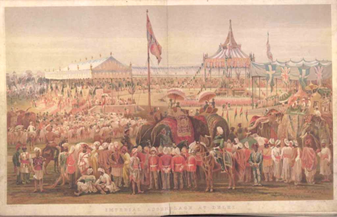HIST 4501A: Assemblage Theory Workshop
Winter 2023
Instructor: Professor Danielle Kinsey

Imperial Assemblage at Delhi 1877 https://cdn2.picryl.com/photo/1877/12/31/the-imperial-assemblage-at-delhi-1877-5f7b34-1024.jpg
Course description: Assemblage theory has been around since the early 1980s and the publication of Gilles Deleuze and Félix Guattari’s A Thousand Plateaus (1980). They used the French word agencement (hard to totally translate but English has assemblage or arrangement or constellation) to tackle the problem of studying complex relationships between bodies, things, ideas, the environment, etc, that are multidimensional, fluid, and transform over time but come together in material ways in a specific context to create and convey meaning. A museum exhibit can be studied as an assemblage, an art installation, an archaeological site, an army, a ceremony, a type of fashion, architecture, an online learning experience – any kind of constellation you want to imagine, really. This openness of definition has frustrated some people because assemblages seem to be everything and nothing. In the realm of material culture studies (the New Materialism) and histories of the body, one of the promises of the theory is that it allows us to think beyond the human versus object binary and embrace how meaning, agency, and historical significance can come through a confluence of different elements. It’s not just about “the clothes make the man” but the body and the clothes are part of the assemblage that creates the significant event, not one aspect on its own.
This seminar-workshop will be about 1) figuring out what assemblage theory is, then 2) figuring out how to apply it to the study of modern British history, 3) carrying out your own research inquiry on a related topic of your choice, and 4) producing a compelling historical or historiographical argument related to this material that is backed up with evidence.
The format of the class will be a weekly, 3-hour, in person seminar in which everyone will be expected to attend and participate every week.
The first few weeks of the course will be about reading and discussing theory, specifically Manuel Delanda’s Assemblage Theory (2016). The next few will be about evaluating examples of assemblage theory in action in historical secondary sources. Then students will present their own idea for a historiographical OR historical research project within modern British studies, carry out that project, share their work “in progress” with the rest of the class for peer review, present their final findings to the group, and produce a final essay.
Required reading will be:
Manuel Delanda, Assemblage Theory, (Edinburgh: U of Edinburgh Press, 2016). 208 pages. ISBN: 9781474413633.
Other readings have not been set but will be available free of charge online either via ARES or Brightspace.